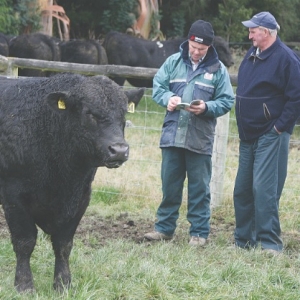The difficult to spot viral disease can cause fertility problems for bulls, and severe losses among cows and calves should a naïve herd become infected.
“All bulls should be tested to check that they’re not carriers and in my view, vaccinated, to prevent them picking up infection from the herd they go to,” says John Pickering of Wanganui Vets, and a member of the BVD steering committee.
While most studs are now testing bulls, not all are vaccinating as well, he notes. Vaccination provides protection for a year so jabs at sale time will still be effective come mating next summer, he points out.
Vaccinations should be repeated every year as infection at any time can have a lasting effect on bull fertility.
“The virus gets into the testicles and affects semen production, reducing fertility. It can be quite significant. Sometimes it’s only temporary, for a couple of months, other times it’s permanent.”
Pickering says background infection of BVD in commercial beef herds is probably more widespread than many realise so there’s a real risk to incoming bulls if unprotected.
Conversely, if a persistently infected or “PI” bull is introduced to a naïve herd (ie never previously infected, so cows have no antibodies) the consequences can be catastrophic, he warns. “I’ve seen absolute devastation, costing hundreds of thousands of dollars.”
Cows fail to conceive, abort, or have PI calves. While infected calves tend to be compromised and often won’t survive, some will and if retained perpetuate the problem in the herd.
Neil Sanderson, a vet and stud angus breeder from Oamaru, believes it’s irresponsible for any breeder to sell bulls that are not BVD tested and vaccinated.
How much the disease contributes to the national average of 17% empties in commercial beef herds isn’t known, he notes, but if it causes 3-4% of cows to fail to produce a calf, then “that’s a very expensive disease,” he stresses.
“There are plenty of commercial herds doing 90, 92 even 93% calving but some are down at 60-70%. It tends to go in regions and the North Island is about 7-8% behind the South Island. That in itself poses the question ‘why?’.”
Sanderson says he doesn’t buy arguments it’s all down to environment and believes the matter needs further investigation.

















